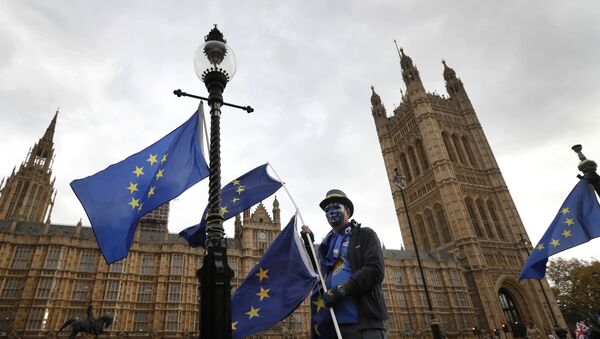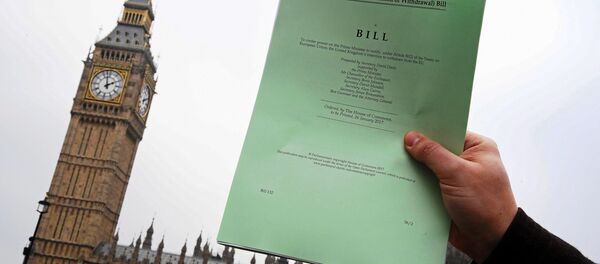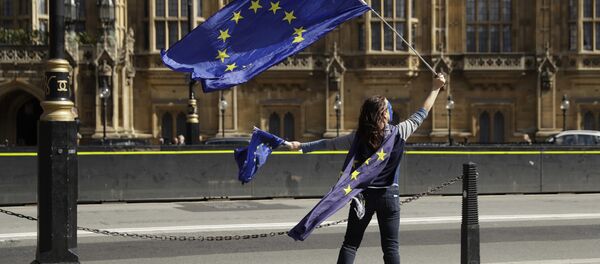It appears that the poisoning of former spy Sergei Skripal and his daughter in Salisbury case has temporarily overshadowed Britons' anguish over the upcoming withdrawal from the EU. However, a year after the historic decision the post-Brexit future of the UK still leaves more questions than answers.
May's 'Hard Facts'
On March 2, 2018 Prime Minister Theresa May outlined the prospects of the UK and EU collaborating after Brexit, shedding light on "hard facts" the British have to accept.
"We are leaving the single market. Life is going to be different. In certain ways, our access to each other's markets will be less than it is now," The British PM highlighted. "The second hard fact is that even after we have left the jurisdiction of the European Court of Justice [ECJ], EU law and the decisions of the ECJ will continue to affect us… The next hard fact is this. If we want good access to each other's markets… we must accept the need for binding commitments."
The amount of the so-called "divorce bill" which the UK has to pay in settlement of its outstanding liabilities to the EU has also been a subject of lively debate. To date, it is expected London will pay about 35 —39 billion pounds ($49 — 54.8 billion) to the European bloc.
While the sides have managed to find a compromise on the transition period, the UK's post-Brexit financial obligations to the Union, UK-Ireland border issues and joint efforts in the spheres of economics, defense, foreign policy and the fight against terrorism and international crime, the details of this future cooperation remain vague.
Meanwhile, the British economy has already suffered losses due to the uncertainty over Brexit: the country's GDP growth slowed down in 2017, inflation has increased and the British pound has weakened.
In addition, Britain's aspirations to preserve the City of London's special status as an international financial center have also been put under threat by the Brexit vote. In May 2017 several global banks signaled that they would move about 9,000 jobs to the continental Europe in the two years, according to The Independent.
Although none of them has left the British capital so far, EU rival cities such as Paris, Frankfurt, Dublin or Luxembourg have stepped up efforts to attract global bankers from the City of London, The Telegraph signaled in March 2018.
A Second Brexit Vote?
The ambiguity related to the post-Brexit future has prompted a campaign for a second Brexit referendum in Britain.
The anti-Brexit group Best for Britain, that was founded on April 26, 2017, kicked off a nation-wide billboard campaign on March 28 insisting that Britons "deserve to have the final say on the Brexit deal."
"As more revelations come to light, and the public demand for a say on the future of the country and its relationship with the EU grows, it's time to demand your MP speaks up for those best of British values of fair play and a fair vote," the campaigners' website said.
"I believe the Government should take a brave and bold decision," Major highlighted. "They should invite Parliament to accept or reject the final outcome of a free vote. By 2021, after the likely two-year transition, it will be five years since the 2016 referendum. The electorate will have changed. Some voters will have left us. Many new voters will be enfranchised. Others may have changed their mind."
'I Hope Brexit Will be Cancelled'
Meanwhile, Britons and EU civilians are trying to mitigate the potential impact of the UK's withdrawal from the European economic bloc: foreign workers and EU citizens are seeking to become recognized as UK residents in advance, fearing they will lose their right to work after Brexit.
"I did not want to wait, no one knows what [restrictions and requirements] the British will adopt," Anna, an Estonian citizen who works as a nanny in the UK, told Sputnik. "They constantly change something, introduce new conditions. I would like to continue working in London, so I needed the status of a resident. I received it quickly, but now all my friends have rushed to obtain it. I think closer to Brexit there will be both queues and delays."
"All this brings inconveniences and problems; I hope that [Brexit] will be canceled," she added.
According to Migration Advisory Committee interim report, Brexit may deal a blow to the country's labor market.
Responding to MAC's findings on the impact of EU migration on the UK, the Confederation of British Industry (CBI) expressed its growing concerns over the UK exit from the European bloc.
"While firms recognize that freedom of movement as we know it will end, restricting access to EU workers — at a time of record employment rates — would leave companies without the staff they need to grow and invest, Neil Carberry, CBI Managing Director for People, said in an official statement. "Overall, EU migration has had a positive impact for the UK economy, creating jobs, growth, and helping to pay for public services such as roads, schools and hospitals."
On June 23, 2016 the UK held the Brexit referendum to decide whether it should stay within or exit the EU. The proponents of the UK's withdrawal from the bloc won 51.9 percent of the vote, versus 48.1 percent. On March 29, 2017 London invoked Article 50 of the Treaty of the EU, which allows a country to leave the Union in two years, after agreeing on the terms of "divorce" with EU member states. It is expected that the UK will officially withdraw from the European Union on March 29, 2019.






